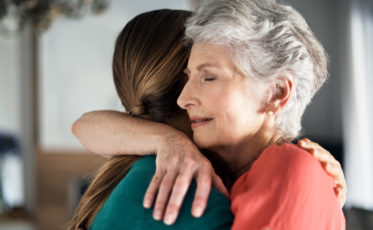What you can expect after you notify us that a customer has died?
After you get in touch with us, we will begin to search our bank systems for accounts and products that we have in the deceased customer’s name or in the name of the deceased and others.
Who gets information about the deceased’s accounts and products?
Once we have found out who is the correct person to get the deceased’s account information and have checked their identity, we will send them a statement of the balance and details of all accounts and products that were held by the deceased with us.
If a solicitor is managing the estate of the deceased customer and you would prefer us to send the account information to them, please give us their name and contact details when you are notifying us and we will do that.
What happens to accounts in the deceased customer’s name i.e. sole current and savings accounts?
We take steps to block the account(s) of the deceased person where it is in their name only. We also place a block on any debit card on the account(s).
What happens to accounts in the deceased customer’s name and others i.e. joint accounts?
Joint accounts are accounts in the name of a deceased person and another person (or other people). In most cases where the deceased had a joint account the surviving account holder is automatically entitled to all of the money in the account.
If the surviving account holder is entitled to the money in the joint account, the account will continue to operate as normal. For example, we will process payments from the account to meet mortgage loan repayments, direct debits and standing orders. We will change the name of the account to the name of the living account holder (or names of the living account holders), once we receive a certified copy of proof of death.
In some cases, however, the surviving account holder will not become automatically entitled to the account on the death of the deceased person. For example, there may be a document that shows the deceased’s share of the account is owned by their estate even after their death. In such cases, the share of the account will form part of the estate of the deceased person.
What happens to joint savings/deposit accounts with over €50,000 where the account holders are not a married couple or civil partners?
If there are one or more savings/deposit accounts held in the joint names of people who are not a married couple or are not registered civil partners and the money in the accounts on the death of an account holder adds up to a total of more than €50,000, we will:
- make sure no more money is paid from the account(s); and
- need an Original Letter of Consent from Revenue Commissioners (IT8 Form) before we remove the name of the person who has died from the savings / deposit account(s).
We strongly recommend you get independent legal or taxation advice from a solicitor or accountant in those circumstances. The Revenue Commissioners may be able to help you. Here are their contact details: Office of the Revenue Commissioners, Capital Acquisitions Tax Unit. Telephone: LoCall 01 7383673.
What happens with direct debits and standing orders?
Direct debits and standing orders in the name of the deceased only: If the account is in the name of the deceased person only, we will stop the payment of money to and from the account after we are notified of the death. This means standing orders and direct debits will no longer be paid from the account(s). You will need to contact all direct debit originators on the deceased’s account. Direct debit originators are the people and organisations who are paid direct debit payments from someone’s bank account. If any direct debits are set up on the account(s) of the deceased, you may need to make new arrangements with the direct debit originators to make sure they continue to be paid.
Direct debits and standing orders in the name of the deceased and others: If the account is in joint names and an account holder dies, in most cases the surviving account holder(s) can continue to operate the account. Standing orders and direct debits will continue as before. It is important to remember that any remaining joint account holder(s) will still be responsible for the account.
What happens to credit cards?
We take steps to stop any credit card working if it belongs to the deceased person. This includes any credit card(s) held by additional cardholder(s) on the credit card account.
What if an additional credit card holder on a deceased’s account needs their own credit card?If the additional cardholder needs a credit card for their own use, they should apply for one in their own name.
What happens if there is money owing on the credit card account that is in the name of the deceased?- We will use any money that is in an account in the sole name of the deceased person to repay what is owed on the credit card or as much of it as possible.
- Where a credit card is protected by insurance we will complete the insurance claim.
- Under succession law, the resources of the estate of the deceased are used to repay any money still owing by the deceased including any on a credit card account.
- We will write to the people who are entitled to get account information to let them know about the credit card account.
- When the primary card holder dies interest will not be charged to the account from date of death from or where it is charged it will be refunded when the account is closed.
What happens to loans/overdrafts?
What happens if there is money owing on a loan or overdraft account in the name of the deceased?We will take steps to block the loan or overdraft account after we are notified of the death. This means, for example, that the estate of the deceased will continue to owe the money on the loan or overdraft.
- We will use any money that is in an account in the sole name of the deceased person to repay what is owed on the loan account or as much of it as possible. We will do the same with any money owing on the overdraft, with your agreement if needed.
- Under succession law, the resources of the estate of the deceased are used to repay any money owing by the deceased including any on an overdraft or loan.
- We will write to the people who are entitled to get account information to let them know about the loan or overdraft account.
The other person (or people) will be responsible for the money that is owing. We generally will change the records on the account so that they only refer to the living person (or people). However, in exceptional cases where we are concerned that the money owing under a loan or overdraft is not going to be repaid by them, we can ask for it to be paid from the estate of the deceased.
For sole overdrafts or loans where the account is closed from 19th July 2021 interest will not be charged to the account from date of death or where it is charged it will be refunded when the account is closed.
Some more information that you may find helpful
What happens with a mortgage loan from Bank of Ireland or Bank of Ireland Mortgage Bank u.c.?
If we find out that the deceased was a mortgage loan customer of Bank of Ireland or Bank of Ireland Mortgage Bank u.c., we will notify the mortgage department on your behalf. They will then be in contact with you on next steps.
If the person who died had Mortgage Protection Insurance/Life Assurance, you should contact the insurance provider. Money claimed under a Mortgage Protection Insurance/Life Assurance policy may repay some or all of the mortgage loan.
If the mortgage loan is in the name of the deceased and another person (or other people) who is (or are) still alive, they will need to continue to make regular mortgage loan repayments until the mortgage is paid off (remember, it may be possible to repay some or all of the mortgage loan through a Mortgage Protection Insurance/Life Assurance policy).
If anyone is concerned that they are unable to meet their regular repayments; they should let our mortgage department know by contacting them on 01 6113333.
What happens with a Bank of Ireland Life / New Ireland Life product?
If we find out that the deceased held a Bank of Ireland Life or New Ireland Life product, we will contact Bank of Ireland Life or New Ireland Life on your behalf. They will then be in contact with you and will advise of the next steps.
Alternatively, if you prefer to contact Bank of Ireland Life or New Ireland Life product yourself, you can call 01-5239813 or email claim@bankofirelandlife.ie or claim@newireland.ie.
What happens with a Bank of Ireland Finance account?
If we find out that the deceased held a Bank of Ireland Finance product (e.g. Hire Purchase on a car), we will contact Bank of Ireland Finance on your behalf. They will then be in contact with you and will advise of the next steps.
Alternatively, if you prefer to contact Bank of Ireland Finance yourself you can call 0818 66 44 66
What happens with a Bank of Ireland Private Banking product?
If we find out that the deceased held a Bank of Ireland Private Banking Product, we will contact Bank of Ireland Private Banking on your behalf. They will then be in contact with you and will advise of the next steps.
Alternatively, if you prefer to contact Private Banking yourself you can call 0818 365 121
What happens with a Bank of Ireland Global Markets account (e.g. foreign currency account)?
If we find out that the deceased had a Global Market account, we will contact Bank of Ireland Global Markets on your behalf. They will then be in contact with you and will advise of the next steps.
Global Markets require a Grant of Probate /Administration to close an account when the total value of the estate in the Republic of Ireland exceeds:
- €35,000; or
- US$30,000; or
- GB£20,000
Please also read the paragraph above under the heading, “What happens to joint savings/deposit accounts with over €50,000 where the account holders are not a married couple or civil partners.” If those are the circumstances, you will need an IT8 Form.


